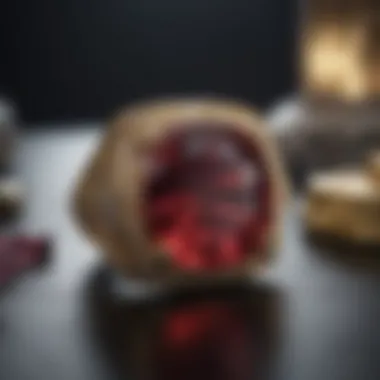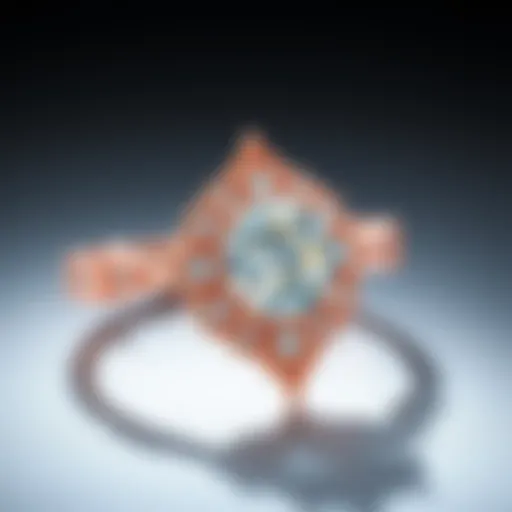Who Can Appraise Jewelry: Roles of Experts Explained


Intro
Jewelry appraisal is a specialized field. It is crucial to understand who can undertake this task expertly, as jewelry holds both monetary and sentimental value. The process involves several factors that require great knowledge and skill. Understanding the roles of appraisers builds a foundation for recognizing the intricacies of the field. This article will navigate through the various appraisers, their qualifications, and how they effectively serve the gemstone industry.
Gemstone Overview
When discussing jewelry appraisal, it’s important to first understand gemstones. Gemstones come in various forms, each with unique characteristics that influence their value.
Description of the Gemstone
Gemstones can be classified into precious and semi-precious categories. Precious gemstones include diamonds, rubies, emeralds, and sapphires. They are often valued for their rarity and beauty. Semi-precious stones like amethyst and garnet are more affordable but still prized. Each gemstone has distinct qualities that a qualified appraiser should recognize.
Physical Properties
The physical properties of gemstones play a key role in their appraisal. Factors such as hardness, refractive index, and specific gravity help determine a stone's value. Here are some essential properties:
- Hardness: Measured on the Mohs scale, which shows a stone's ability to resist scratches.
- Color: The hue, saturation, and tone of a gemstone significantly affect its market value.
- Clarity: Refers to how free a gemstone is from inclusions or blemishes, impacting its overall quality.
- Cut: A well-cut gemstone reflects light and enhances its brilliance.
Understanding these properties allows appraisers to give a precise estimate of a gemstone's worth.
Importance of Jewelry Appraisal
Jewelry appraisal is not just about determining prices. It can aid in various situations:
- Insurance: Proper valuation ensures that your assets are covered in case of loss.
- Estate Planning: Assists in dividing jewelry among heirs based on accurate values.
- Selling gemstones: Understanding value helps sellers negotiate better deals.
"Appraisals reflect not only the market value but also the craftsmanship and history behind each piece."
Being knowledgeable about appraisers and their role ensures effective evaluations. The following sections will detail the types of appraisers, the importance of certification, and their contribution to the gemstone industry.
Prelims to Jewelry Appraisal
Jewelry appraisal is a subtle yet significant aspect of the gemstone and jewelry industry. It involves an expert evaluation of jewelry pieces to determine their value, authenticity, and other essential characteristics. The importance of jewelry appraisal spans various areas such as insurance, resale, and estate planning. Understanding who appraises jewelry ensures the pieces are evaluated correctly, confirming their worth and safeguarding the interests of owners and potential buyers.
Professional appraisers can provide insights not just into the monetary value of a piece, but also its historical context and market trends, which are crucial for collectors and enthusiasts alike.
Defining Jewelry Appraisal
Jewelry appraisal refers to the process of assessing the quality and value of jewelry items. This evaluation is typically carried out by trained and certified professionals who possess both knowledge and experience in the field. An appraisal usually results in a detailed report outlining the piece's specifications, including its materials, craftsmanship, and market value.
Valuation can be influenced by multiple factors, such as gemstone quality, metal content, and design intricacy. There are specific methodologies involved in the appraisal process, which rely on both technical expertise and in-depth market knowledge. Each report ultimately serves a legal or financial purpose, which adds to the gravitas of the appraisal process.
Why Jewelry Appraisal is Necessary
Jewelry appraisal holds substantial importance for various reasons:
- Insurance Requirements: Many insurance policies stipulate that valuables must be appraised to ensure proper coverage. An accurate appraisal can protect investments from loss due to theft, damage, or natural disasters.
- Selling or Buying: When engaged in buying or selling jewelry, an appraisal helps establish a fair price. Sellers can assure potential buyers of the item's legitimacy and value.
- Estate Planning: In the context of estate management, appraisals are necessary for accurately determining the monetary value of an estate's jewelry assets. This is vital for equitable division among heirs.
- Legal Considerations: Appraisals can also play a crucial role in legal disputes, where the value of jewelry may be contested or required as evidence.
Understanding the roles of jewelry appraisers not only helps in navigating these situations but also emphasizes the trust placed in these professionals. Engaging with certified appraisers ensures that individuals receive meticulous and unbiased evaluations, which are essential in maintaining the integrity of jewelry transactions.
Types of Jewelry Appraisers
Understanding the various types of jewelry appraisers is fundamental for anyone navigating the world of jewelry appraisal. Each type serves a specific purpose and offers distinct advantages that cater to different needs. The landscape of jewelry appraisal is diverse, and recognizing who can effectively assess the value of jewelry can lead to better decision-making for collectors, jewelers, and consumers alike.
Independent Appraisers
Independent appraisers operate separately from jewelry retailers or manufacturers. Their primary objective is to provide an unbiased assessment of a piece's value. They are often well-respected professionals with a wealth of experience because they usually rely on their reputation to secure clients.
Advantages of Independent Appraisers:
- Objectivity: They are less likely to have conflicts of interest, ensuring that the appraisal reflects true market value.
- Flexible Services: Many independent appraisers offer mobile services, allowing them to meet clients at convenient locations.
- Diverse Expertise: They often cover a broad range of jewelry types, enhancing their ability to evaluate unique pieces.
However, it is essential to assess their credentials and experience before engaging. Clients must confirm that the appraiser possesses appropriate qualifications and is familiar with the specific type of jewelry in question.
Appraisers Affiliated with Retailers
Retailer-affiliated appraisers work within jewelry stores or chains. Their role typically involves evaluating jewelry for sale or trade-ins. Since they are part of the business, they may have access to a vast inventory of market data and trends, which can aid in providing accurate evaluations.
Considerations for Retailer-Affiliated Appraisers:


- Customer Loyalty: They may prioritize maintaining a positive relationship with clients to encourage future sales.
- Potential Bias: Since they operate within the retail environment, their appraisals might lean towards what qualifies for sales rather than impartial values.
- Limited Scope: Their expertise may be more narrow and focused on the lines of jewelry associated with the retailer.
While this type of appraiser can offer quick assessments, consumers should remain aware of potential biases and seek second opinions when necessary.
Certified Appraisers
Certified appraisers hold recognized qualifications and have completed formal training in gemology and appraisal techniques. They typically possess certifications from reputable organizations, lending credibility to their evaluations.
Benefits of Working with Certified Appraisers:
- Enhanced Trustworthiness: Their certification demonstrates that they have undergone rigorous training and adhere to industry standards.
- Accurate Valuations: They are trained to consider a broad spectrum of factors, including market conditions and recent sales data.
- Professional Ethics: Many certified appraisers abide by a strict code of ethics, which mandates fairness and transparency in their appraisals.
"Employing certified appraisers ensures that you are receiving a professional and detailed evaluation of your jewelry, which can later prove invaluable, especially in legal or insurance contexts."
In summary, understanding the different types of jewelry appraisers is crucial. Each category—independent, retailer-affiliated, and certified—offers unique advantages and considerations. Making the right choice depends on specific needs and understanding the implications associated with each type.
Qualifications of Jewelry Appraisers
The qualifications of jewelry appraisers play a crucial role in establishing trust and credibility in the appraisal process. Understanding the educational and professional background of appraisers is essential for anyone seeking their services. When choosing an appraiser, potential clients should prioritize qualifications, as it directly affects the accuracy and reliability of evaluations. Experienced appraisers with the right qualifications are better equipped to provide detailed knowledge on gemstones, jewelry design, and the prevailing market conditions.
Educational Background
A solid educational background underpins the expertise of successful jewelry appraisers. Many appraisers pursue degrees in gemology, jewelry design, or related fields. Courses cover the study of gemstones, metals, and their various properties, providing a well-rounded understanding necessary for appraisal.
Associated colleges and institutions often offer gemology programs that combine theoretical knowledge with hands-on experience. This combination ensures that appraisers can identify, assess, and evaluate pieces accurately. Ongoing education is also crucial as market trends change and new technologies emerge. By staying informed, appraisers can maintain their competitive edge and provide the best possible service.
Certifications and Designations
Certifications add significant value to a jewelry appraiser's qualifications. Specific credentials indicate advanced training and expertise, which can enhance their reputation and client trust. Here are some notable certifications:
Certified Gemologist
Being a Certified Gemologist is an esteemed designation in the industry. This certification typically involves intensive training which focuses on gemstones and their characteristics. A key aspect of this certification is the in-depth knowledge of gem identification, grading, and valuation.
Advantages: Certified Gemologists have access to specialized resources and tools, allowing them to conduct precise evaluations. This designation is often viewed as a mark of excellence, making it a popular choice for many appraisers.
Disadvantages: However, the rigorous training can be time-consuming and costly, which might deter some from pursuing it.
Graduate Gemologist
The Graduate Gemologist certification signifies a higher level of understanding in gemology. This program emphasizes comprehensive training in both the appraisal and grading of gemstones.
Advantages: A significant characteristic of the Graduate Gemologist is their extensive training in identifying not only natural gems but also synthetics and treatments that can affect value. This knowledge is vital for delivering accurate appraisals in today's market.
Disadvantages: Like the Certified Gemologist, it requires a commitment of time and financial resources, which might limit access for some individuals.
Certified Appraiser
The Certified Appraiser designation focuses on the appraisal process itself rather than solely on gemology. It often includes training in ethics, standards of practice, and legal aspects of appraisal.
Advantages: The Certified Appraiser is well-versed in the correct methodologies for fair market value assessments, ensuring that the appraisals are not just current but also adhere to professional standards. This designation provides credibility, which is essential when dealing with valuable items.
Disadvantages: The certification may not delve deeply into the nuances of gemstone evaluation, which may require the appraisers to work alongside gemologists to ensure comprehensive assessments.
By understanding the skills and qualifications of jewelry appraisers, individuals can make informed decisions when selecting an expert for their needs.
Skills Required for Jewelry Appraisal
Jewelry appraisal is not just about assigning a value to a piece; it requires a unique skill set that combines technical knowledge, a keen eye for detail, and an understanding of market trends. Each skill contributes to the overall effectiveness of an appraiser in evaluating jewelry accurately and fairly. This section discusses the essential skills requisite for jewelry appraisal, emphasizing their significance and practical implications.
Knowledge of Gemstones
A profound understanding of gemstones is central to the jewelry appraisal process. Appraisers must recognize the differences among various types of gemstones, including diamonds, sapphires, rubies, and emeralds. Their expertise allows them to identify natural stones versus synthetic or treated variations. Knowledge encompasses not just aesthetics but also the geological properties of gemstones, such as hardness, color, clarity, and cut.
Evaluating gemstones means knowing how these features contribute to their overall value. For instance, the clarity of a diamond significantly influences its worth. A skilled appraiser can discern inclusions and blemishes that may not be apparent to a layperson. Moreover, familiarity with gemstone trends enables the appraiser to offer insights on what is in demand within the market.
Understanding of Jewelry Design
Jewelry appraisal also requires a deep comprehension of jewelry design. Appraisers must assess how a piece is constructed, including the quality of craftsmanship, the materials used, and the style of the design. This skill set extends beyond general knowledge; it involves understanding various techniques and aesthetics linked to different periods and cultures. An appraiser’s insight into design elements can influence the valuation, especially for antique or vintage items where design reflects historical significance.


Different styles of settings or types of metal also impact how a piece will be evaluated. Therefore, recognizing the nuances in design helps appraisers provide a more accurate and comprehensive report. In essence, an appraiser with strong design knowledge can appreciate the artistry behind each piece, adding an extra layer of value to their assessments.
Market Awareness
A successful jewelry appraiser must maintain a keen awareness of current market trends. The value of jewelry can fluctuate based on various factors, including economic conditions, consumer preferences, and fashion influences. Appraisers need to stay informed about market dynamics to understand how these factors can affect jewelry pricing.
Additionally, awareness of trends can lead to better client recommendations. For instance, an appraiser may identify which styles are growing in popularity or which gemstones are becoming scarce. This information is valuable not only for the appraisal process but also for clients looking to buy or sell pieces.
Market awareness means being connected to the gemstone and jewelry communities. Attending trade shows, following relevant publications, and engaging with online forums or groups, such as those found on Reddit or Facebook, can enhance an appraiser's understanding of the market landscape.
"A knowledgeable appraiser is not just a technician; they are a storyteller who recognizes the value of each piece beyond its monetary worth."
The Appraisal Process
Understanding the appraisal process is crucial in jewelry evaluation. It encompasses every step from the initial consultation to the final documentation. Each phase is thoughtfully executed to ensure an accurate and reliable assessment of the jewelry's value. This process not only aids in determining worth but also plays a role in various scenarios, such as insurance claims, estate sales, or legal disputes.
Initial Consultation and Assessment
The appraisal journey begins with the initial consultation. During this phase, the appraiser interacts with the client to grasp the purpose of the appraisal. This could involve assessing a piece for insurance, estate planning, or simply curiosity about its market value.
This dialogue is essential. The appraiser asks pertinent questions, capturing vital information such as the item's history, any previous appraisals, and the client's expectations. This initial assessment sets the tone for the entire process, ensuring that both parties are aligned.
Evaluation Techniques
Visual Inspection
Visual inspection is a primary technique in jewelry appraisal. This method allows the appraiser to examine the piece closely, identifying key attributes such as craftsmanship, color, clarity, and overall condition. The ability to visually assess properties is invaluable. It is often the first step in establishing a base value.
One of the significant characteristics of visual inspection is its immediacy. It offers instant feedback on the quality of the jewelry. However, while this method is beneficial for a quick assessment, it has limitations. Some nuances may only be revealed through further techniques or technology.
Technology Utilization
Technology utilization in appraisal introduces advanced methods such as magnification tools, specialized lighting, and even non-invasive testing. These tools augment the visual inspection, allowing appraisers to uncover details that the eye might miss. For instance, gemological microscopes can reveal inclusions, surface abnormalities, or treatments applied to gemstones.
A notable feature of technology is its ability to provide objective data that supports the appraiser's findings. This is particularly useful in a landscape where valuations can be subjective. However, reliance on technology does necessitate a skilled operator. Knowing when and how to use these tools is essential for accurate appraisal.
Documentation and Reporting
Documentation is the culmination of the appraisal process, where all findings are meticulously recorded. This document serves multiple purposes: it provides proof of the appraisal for insurance, estate purposes, or resale, and it can facilitate further discussions in cases of legal disputes. A well-structured report delineates every detail about the jewelry, from the materials used to the appraisal value, ensuring transparency.
In summary, the appraisal process is not merely a task; it is a comprehensive journey requiring careful planning and execution. Each phase contributes to achieving an accurate representation of the jewelry's value, supporting the client’s needs and enhancing the reliability of the appraisal.
Common Situations Requiring Appraisal
Jewelry appraisal serves critical roles in various circumstances. Understanding these scenarios helps individuals appreciate the importance of professional evaluation. Whether for insurance, estate planning, or legal issues, the reasons for obtaining an appraisal vary but all underline the necessity of having accurate assessments from certified experts. Here, we will examine three common situations where jewelry appraisals become essential.
Insurance Purposes
Insurance is one fundamental area that requires thorough jewelry appraisals. A detailed appraisal ensures that the value of valuable items is adequately covered, protecting owners against loss. When insuring jewelry, the insurer typically demands an appraisal report. This report provides an accurate valuation that forms the basis for the insurance premium.
Often, changes in market conditions can influence jewelry values. A piece that was appraised years ago may have increased or decreased in value. Hence, maintaining updated appraisals is crucial.
- Ensures proper coverage
- Protects against loss or theft
- Helps renegotiate premiums
Having an up-to-date appraisal can also facilitate smoother claims processes, should the need arise. Without this, individuals may face challenges in receiving fair settlements.
Estate Appraisal
Another common situation necessitating appraisal involves estate planning. When a person passes away, their jewelry must often be evaluated for estate taxes or distribution among heirs. An accurate appraisal helps in determining the value of the estate as a whole.
This appraisal plays a key role in:
- Calculating estate taxes
- Equitably distributing jewelry among beneficiaries
- Protecting against possible disputes
One might consider involving a certified appraiser to ensure that the valuations are impartial and reliable. This step can potentially prevent disagreements or misunderstandings among family members regarding the jewelry's worth.
Legal Matters and Disputes
Jewelry appraisals also play a significant role in legal matters and disputes. Issues may arise in divorce settlements, inheritance disagreements, or cases of theft. In these situations, a professionally prepared appraisal can serve as objective evidence in court.


In legal cases, appraisals help in:
- Establishing the value of assets
- Supporting claims for rightful ownership
- Guiding negotiations or settlements
A certified appraiser is often called upon to provide unbiased opinions that can shape the outcomes of legal proceedings. Their expertise ensures that the process remains fair and grounded in accurate valuations.
An appraisal is not just a number; it's a detailed analysis of the item's worth, crafted by professionals who understand the complexity of jewelry valuation.
In summary, whether concerning insurance, estate planning, or legal disputes, obtaining a jewelry appraisal is vital. By recognizing these scenarios, individuals can appreciate the importance of involving knowledgeable experts in the process. This approach not only safeguards their interests but also enhances their understanding of the value and significance of their jewelry.
Selecting the Right Appraiser
Choosing the right jewelry appraiser is crucial for several reasons. An accurate appraisal not only provides a valuation for insurance or resale but also affects the trustworthiness of subsequent transactions. A qualified appraiser brings expert knowledge and adherence to established standards, ensuring the appraisal's legitimacy. This section outlines key considerations for selecting an appraiser, helping you make informed decisions.
Researching Credentials
Examining the credentials of potential appraisers is fundamental. Look for certifications from reputable organizations. Appraisers may possess certifications such as Graduate Gemologist from the Gemological Institute of America (GIA) or those accredited by the American Society of Appraisers (ASA). Understanding educational backgrounds helps ascertain their level of expertise. Furthermore, the appraiser's affiliation with professional bodies often reflects a commitment to ethical standards and ongoing education. Verify credentials on official websites or through direct inquiries. This diligence can save you from possible pitfalls later.
Reading Reviews and Testimonials
Reviews and testimonials serve as valuable insights into the experiences of previous clients. Look for appraisers with consistent positive feedback. Platforms like Yelp, Google Reviews, and specialized forums can provide buyer perspectives. Pay attention to comments regarding not just the appraisal accuracy but also the appraiser's communication skills and professionalism.
Sometimes, people oversight a handful of negative reviews. It’s key to assess whether these issues seem isolated or recurrent. A well-rounded view is essential, as each person's expectations may differ.
Inquiring about Experience and Specialization
Experience does matter significantly. Inquire how long the appraiser has worked in the field and the types of jewelry they specialize in. Certain appraisers may have in-depth knowledge of antique pieces, whileothers might be adept at modern luxury items like Rolex watches. Asking about specialization ensures you are paired with someone who has relevant experience concerning your specific piece.
A discussion about past appraisals can also provide clarity on their approach and methods. Consider asking for case studies or examples of work.
A qualified appraiser is an invaluable partner in ensuring that your jewelry is properly valued for its uniqueness and market demand.
Thus, regarding all these elements—credentials, reviews, and experience—take time to conduct due diligence. Selecting an appraiser is not merely a transactional process but an investment in the security and integrity of your jewelry holdings.
Ethics in Jewelry Appraisal
Ethics in jewelry appraisal is crucial for maintaining trust between appraisers and their clients. In a field where high financial stakes and sentimental value intertwine, upholding a robust ethical framework is not just a best practice, but a necessity. Appraisers must commit to honesty, integrity, and confidentiality to protect clients’ interests and to foster a reputation for reliability in the gemstone industry.
Code of Conduct
A well-defined code of conduct serves as a guideline for jewelry appraisers. This code generally includes principles such as:
- Objectivity: Appraisers must provide evaluations based purely on facts without personal bias.
- Transparency: Clear communication regarding methods and findings is essential. Clients deserve to understand how appraisals are formed.
- Honesty: Misrepresentation or exaggeration in appraisals is unethical. Appraisers should provide accurate market values without inflating prices for personal gain.
Adhering to this code helps appraisers navigate ethical dilemmas. It also promotes a culture of professionalism in the jewelry appraisal community. When appraisers operate within a structured ethical framework, clients can feel secure in their assessments.
Conflicts of Interest
Conflicts of interest in jewelry appraisal can severely undermine the appraisal process. Such conflicts arise when an appraiser's personal interests, relationships, or financial incentives could compromise their objectivity. For instance, if an appraiser is affiliated with a retailer, their evaluations may skew higher than fair market value to increase sales.
To mitigate conflicts of interest, appraisers should:
- Disclose relationships: All associations that may impact appraisal should be clearly stated to clients.
- Avoid dual roles: Appraisers should not blend their roles as sellers or brokers, as this can blur lines of trust.
- Seek third-party evaluations: In cases where potential conflict exists, involving an independent appraiser can provide an unbiased assessment.
Implementing these practices not only safeguards the integrity of the appraisal but also protects the client’s interests. Ultimately, ethical jewelry appraisal fosters a trustworthy environment that benefits all involved in the transaction.
Finale
In this article, we have explored the intricate world of jewelry appraisal, delving into the roles and qualifications of different experts in this field. Understanding who can appraise jewelry is fundamental for anyone involved in the gemstone industry, whether as collectors, designers, or enthusiasts. The expertise of an appraiser can significantly influence the value and authenticity of jewelry.
The Importance of Expert Knowledge
Expert knowledge is paramount in jewelry appraisal. Only trained professionals have the necessary insights to evaluate gemstones and jewelry accurately. They utilize a combination of education, certifications, and experience to assess various factors, including quality, condition, and market trends. For instance, a certified gemologist applies rigorous methodologies that consider the unique properties of each piece.
"Expertise cannot be overlooked when it comes to the value of jewelry. It connects the art of valuation with the science of materials."
This depth of knowledge not only determines the monetary value but instills confidence among buyers and sellers involved in transactions. Jewelry appraisers also keep abreast of market demands, ensuring their assessments reflect current trends, which can be vital for investment decisions.
Navigating the Appraisal Landscape
Navigating the jewelry appraisal landscape can be daunting without the right guidance. The choices available, from independent appraisers to those affiliated with retailers, can vary widely in terms of credibility and focus. It is essential to research the credentials of potential appraisers thoroughly. Reading reviews, checking certifications, and confirming areas of specialization can help in making informed decisions.
- Identify Specialized Appraisers: Look for professionals who specialize in particular types of jewelry or gemstones.
- Verify Credentials: Ensure that the appraiser has recognized certifications like Graduate Gemologist or Certified Appraiser.
- Seek Reviews and Testimonials: Personal experiences can give a clearer picture of an appraiser’s reliability and competence.
By understanding the roles of different experts and the appraisal process itself, individuals can better navigate their needs in jewelry appraisal. Being vigilant in the selection process protects investments and perpetuates trust in the jewelry market.
Overall, expertise and diligence play key roles in ensuring a fair and accurate appraisal, which is essential not only for the financial aspect but also for appreciating the craftsmanship and history behind each piece.







